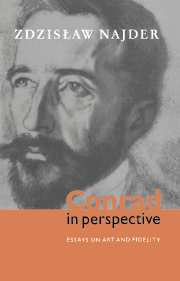Book contents
- Frontmatter
- Contents
- Acknowledgements
- Note on the texts
- List of abbreviations
- 1 Introduction, or confession of a mastodon
- 2 Conrad's Polish background, or from biography to a study of culture
- 3 Joseph Conrad's parents
- 4 Joseph Conrad and Tadeusz Bobrowski
- 5 The Sisters: a grandiose failure
- 6 Lord Jim: a Romantic tragedy of honour
- 7 The Mirror of the Sea
- 8 A Personal Record
- 9 Joseph Conrad's The Secret Agent, or the melodrama of reality
- 10 Conrad, Russia and Dostoevsky
- 11 Conrad and Rousseau: concepts of man and society
- 12 Conrad and the idea of honour
- 13 Joseph Conrad: a European writer
- 14 Joseph Conrad after a century
- 15 Joseph Conrad in his historical perspective
- 16 Fidelity and art: Joseph Conrad's cultural heritage and literary programme
- Notes
- Index
10 - Conrad, Russia and Dostoevsky
Published online by Cambridge University Press: 07 December 2009
- Frontmatter
- Contents
- Acknowledgements
- Note on the texts
- List of abbreviations
- 1 Introduction, or confession of a mastodon
- 2 Conrad's Polish background, or from biography to a study of culture
- 3 Joseph Conrad's parents
- 4 Joseph Conrad and Tadeusz Bobrowski
- 5 The Sisters: a grandiose failure
- 6 Lord Jim: a Romantic tragedy of honour
- 7 The Mirror of the Sea
- 8 A Personal Record
- 9 Joseph Conrad's The Secret Agent, or the melodrama of reality
- 10 Conrad, Russia and Dostoevsky
- 11 Conrad and Rousseau: concepts of man and society
- 12 Conrad and the idea of honour
- 13 Joseph Conrad: a European writer
- 14 Joseph Conrad after a century
- 15 Joseph Conrad in his historical perspective
- 16 Fidelity and art: Joseph Conrad's cultural heritage and literary programme
- Notes
- Index
Summary
Immediately after its publication Under Western Eyes was granted the label of an anti-Russian book, and it stuck: such has been the prevailing view of Western critics and scholars since. Indeed, its text abounds in sharply critical remarks about the Russian national character, which can be used to support this view. The issue of whether it has either a Western, or a Polish bias has been raised and discussed innumerable times. Only the evident limitations of the horizons of the somewhat stuffy narrator, the Geneva-based English teacher of languages, save the novel's general perspective from being simply identified with the ‘Western eyes’ of the title. Still, a common critical assumption is that Russia as a whole is here viewed from the outside – and summarily condemned.
Under Western Eyes was one of Conrad's first works to be translated into Russian: in 1912, almost immediately after its publication. In 1925, eight years after the Bolshevik Revolution, a new translation appeared. Both were well received by the critics, who commented about the obvious analogies with Dostoevsky's Crime and Punishment as well as echoes of The Devils, but did not complain of anti-Russian prejudice: on the contrary, Conrad was repeatedly praised for his knowledge of Russian realities and for his psychological perspicacity.
Why was it so? First, the very fact that Under Western Eyes received in 1912 the approving stamp of official censorship indicates that the atmosphere in Russia had changed from the period described in the novel.
- Type
- Chapter
- Information
- Conrad in PerspectiveEssays on Art and Fidelity, pp. 119 - 138Publisher: Cambridge University PressPrint publication year: 1997

